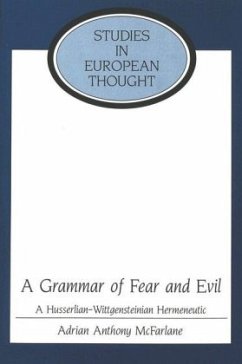A Grammar of Fear and Evil examines the phenomenon of fear as a primary context for the problem of evil. It claims that whereas the locution 'evil' is primarily a religious interpretation of life's troubling experiences, fear is the primary experience on which this interpretation builds. Thus, the problem of evil has to be seen in the light of the fears that inform our interpretations. A grammar of fear makes possible both the description and the modalization of fear. The one deals with the ongoing relations between self and world, while the other deals with the ways in which the relationships are approached. One of the ways of dealing with these relationships is to attribute ultimate significance - evil and good - to the threats and securities we experience.
"This work breaks new ground by providing a careful and sustained phenomenological and a grammatical description of the many faces of fear. Of special interest is the evocative analysis of the phenomenon of evil as it relates to, and is shaped by, fear". (Robert S. Corrington, Drew University)
"Professor McFarlane has written a highly sophisticated and illuminating study. Demystifying standard approaches to the theodicy questions, he brilliantly leads the reader step-by-step through false understandings of evil out into the clear light of language and consciousness. Although this is a tough-minded philosophical work, weaving together linguistic analysis (Wittgenstein) and phenomenological (Husserl), it has a surprisingly powerful therapeutic effect, exorcising the demons of thought that haunt the relation between fear and evil. In the end, Dr. McFarlane with remarkably keen sensitivity to his reader, convincingly demonstrates that the theological language game is the proper context for a discussion of the transformation of fear and a constructive reinterpretation of evil. Rarely, if ever, has philosophy dealt so creatively and effectively with these issues." (James E. Loder, Princeton Theological Seminary)
"Professor McFarlane has written a highly sophisticated and illuminating study. Demystifying standard approaches to the theodicy questions, he brilliantly leads the reader step-by-step through false understandings of evil out into the clear light of language and consciousness. Although this is a tough-minded philosophical work, weaving together linguistic analysis (Wittgenstein) and phenomenological (Husserl), it has a surprisingly powerful therapeutic effect, exorcising the demons of thought that haunt the relation between fear and evil. In the end, Dr. McFarlane with remarkably keen sensitivity to his reader, convincingly demonstrates that the theological language game is the proper context for a discussion of the transformation of fear and a constructive reinterpretation of evil. Rarely, if ever, has philosophy dealt so creatively and effectively with these issues." (James E. Loder, Princeton Theological Seminary)

